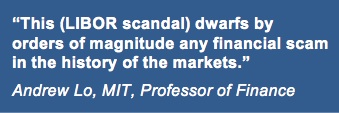Deutsche Bank and UBS have their profits for this quarter undermined by potential legal costs in the midst of banking scandals, while Rabobank of the Netherlands is fined $1 billion by Dutch, British and American regulators over another Libor interest rate fixing scandal.
Rabobank’s chief executive, Piet Moerland has had to resign.
Since Barclays Bank’s £290m ($454m) fine by American and British authorities in 2012, regulators have been investigating possible illegal activities with regard to Libor inter-bank lending rates.
Deutsche Bank, the largest bank in Germany, announced that it has put aside €1.2 billion to cover possible lawsuit losses, bringing its third-quarter profits down to €51 million ($70 million) compared to a €754 million ($1,036 million) profit during the same period last year.
Deutsche Bank’s litigation reserves now amount to €4.1 billion.
Although UBS managed to make a profit of 577 million Swiss francs ($642 million), compared to a 2.1 billion Swiss francs ($2.34 billion) loss during the same period in 2012, the Swiss regulator has told it to put money aside to cover potential lawsuits.
Banking scandals becoming ubiquitous
Over the last few years the banking sector has been fraught with scandals, such as Libor fixing.
Libor, or LIBOR, stands for the London Interbank Offered Rate. It is the average interest leading banks in London estimate that they would be charged if they borrowed from other banks. Libor inter-bank lending rates are used to set massive (trillions of dollars) financial contracts.
At least twelve major banks and brokerages are being investigated for manipulating Libor inter-bank lending rates. Citigroup, JP Morgan and Deutsche Bank are among them.
Jürgen Fitschen and Anshu Jain, Co-CEOs of Deutsche Bank, said:
“In the third quarter we met several challenges. We took substantial litigation charges and saw reduced profits in investment banking, leading to a lower quarterly result. Notwithstanding this, we made progress in key areas. In this quarter alone, we achieved approximately 15% of our 2015 balance sheet reduction target of EUR 250 billion. Our Operational Excellence Program remained on track in delivering cost savings and we sustained investments in our control functions. In addition, Deutsche Asset & Wealth Management produced one of its strongest ever quarters.”
“We’re moving forward, step by step, on our three-year strategic journey of building a world-class platform for Deutsche Bank. Along the way, we have confronted challenges and will meet others in coming quarters. However, we are encouraged by our progress against our long-term objectives and are confident that we will deliver.”
On announcing UBS’s third-quarter 2013 results, the bank said that although it had warned during the second quarter that the third quarter would be challenging, it managed to deliver a profit.
USB’s Chief Executive Officer Sergio P. Ermotti said, “Our results this quarter provide more evidence that our business model works in a variety of market conditions. One year into the acceleration of our strategy we are ahead of plan on execution. We will remain disciplined to deliver the best of UBS to our clients and fulfill our commitments to our shareholders.”
USB warned that its regulatory obligations (having to put money aside for possible lawsuits) means its profit targets for 2015 will be affected.
According to the New York Times, British bank Lloyds has set more money aside to compensate customers for “inappropriate insurance products”.Who do these banking scandals keep emerging?
Millions of non-banking people around the world read this news and wonder how it is – after hundreds of billions of dollars, euros, pounds and Swiss francs from tax payers were used in Europe and North America to bail out these financial institutions during the financial crisis of 2008 and the Great Recession that followed – that so many manage to continue behaving in such an irresponsible manner.

